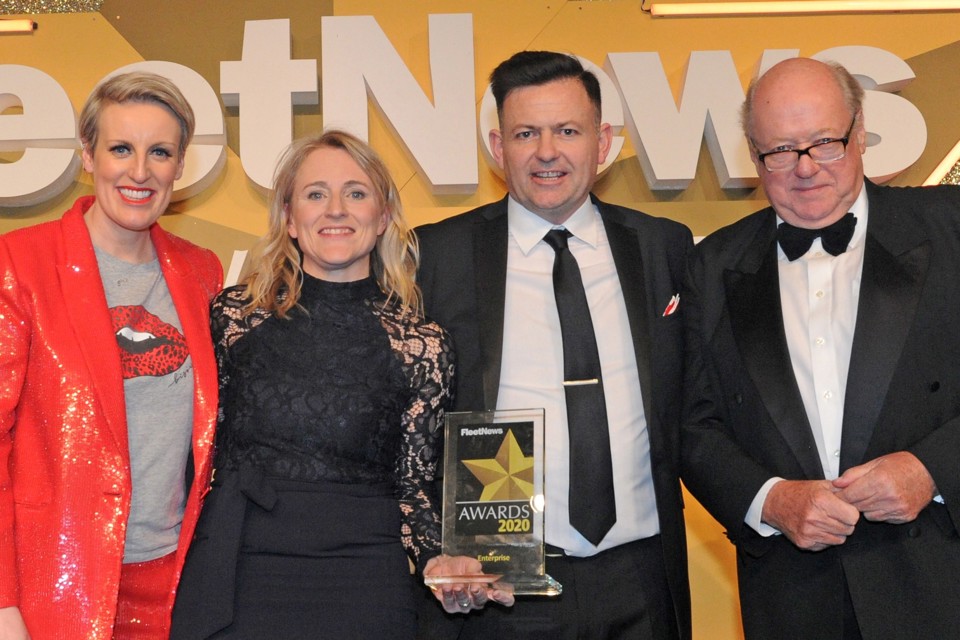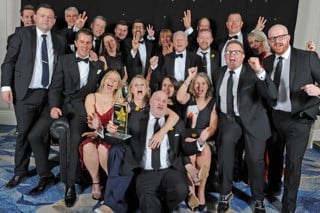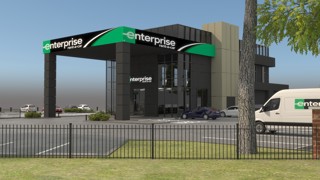Enterprise Rent-A-Car’s ability to adapt its business to changing customer demands helped it win the Best Rental Company accolade at this year’s Fleet News Awards.
Since then, this adaptability has also enabled Enterprise to navigate its way through some of the trickiest trading conditions, due to the coronavirus crisis, the company has ever seen.
Adrian Bewley, assistant vice-president for European business rental at Enterprise Rent-A-Car (pictured, second from right), says: “I wouldn’t underestimate how quickly the world changed in March (when the first lockdown was introduced). Demand from our customers changed almost overnight.”
The expectation of service demand and delivery, according to the sector customers operated in, had gone. People were not travelling any more.
One of the biggest issues for the industry was providing customers with the confidence that they would not catch Covid-19 by renting a car.
Customers were saying ‘I will continue to rent vehicles from you if I know I’m safe and secure, and I won’t catch the disease’ .
Bewley continues: “We needed to restore confidence in the market and that’s one of the reasons we’ve seen such a high adoption rate during the crisis based on our ability to provide a safe product.”
Enterprise reinforced its commitment to maintaining the highest standards of cleanliness back in May by announcing the Complete Clean Pledge for its car rental operations, as well as its commercial vehicle rental, retail car sales, car club and vehicle subscription services.
Paul McCorkell, assistant vice-president of business rental UK and Ireland, explains: “Our pledge has just become a way of life now. It includes a 20-point inspection process, which is followed every time. Customers need to know and feel confident that we’re doing these things.”
Fleet News: So how else has coronavirus changed the rental experience for customers?
Paul McCorkell: What we’re seeing now is to have as much of a ‘low touch, no touch’ approach to rental experience as is possible. Ultimately, low touch is going to lead to a no touch contactless rental in the coming weeks and months.
It’s something we’ve been working towards, but it’s now been expedited during this time of crisis. We’ve just continued listening to our customers and one of the key things we heard back from them and our employees was they wanted as minimal contact as possible during the handover.
FN: How else have you had to adapt services during the pandemic?
PM: We’ve had to respond to the fact that people are just travelling differently.
We saw a lot of customers want to use rental cars and car clubs as an alternative to public transport, especially when the lockdown was first lifted.
Customers were also looking to hire vehicles for longer periods of time to add to their own fleet. We’ve really had to react and adapt to the changing circumstances.
Our branch staff, the people on the frontline, have been phenomenal. They’ve shown real compassion and empathy to our customers and adapted really well.
FN: Are more fleets looking to flexible rental rather than contract hire because of the crisis?
PM: All organisations now are having to make tough decisions about their capital investment; should they purchase vehicles for the long term, if so, how many?
They’ve got so many questions that are quite difficult for them to answer at the moment and, because of that uncertainty, organisations are looking for more flexible alternatives. We’ve seen a massive rise in that area.
It works both ways, with organisations wanting to take on additional vehicles, because of increased demand and others may want to reduce their fleet due to reduced demand. Our Flex-E-Rent division allows them to add or remove vehicles at very short notice.
FN: What about people working from home, what impact has that had?
PM: One of the areas we’re seeing growing demand is from organisations wanting to help us deal with their grey fleet.
As more and more people are starting to work from home, it changes the way our corporate customers are going to travel.
Previously they might have used a pool car, but now they’re working from home and that option is not available to them, they’re much more likely to use their own vehicle.
We’re working with customers to help them introduce travel management solutions, such as Enterprise Travel Direct, our online travel management tool.
FN: How difficult has it been understanding changing customer needs?
Adrian Bewley: We found a way to be relevant as often as we possibly could. We talked to our customers at least once a day to find out what the challenges there were on that particular day and how we could help.
By being proactive it enabled us to understand how we might form that new level of relevance.
We were very resolute, we kept asking our customers questions, ‘how are we going to move people and goods around in the future, how will it look different?’ and we’ve heard some creative ideas from our customers which have allowed us to adapt.
By being in private ownership, it’s given us the privileged position to think about it and it’s given us some valuable information of how things might look a year or two hence, but there is nothing happening right now that I can say this is going to be a change for the future.
FN: How dramatic is the change you’ve seen in the market and do you think it’s here to stay?
AB: We have noticed a monumental shift. Business travel may have changed for good – I don’t know yet – but people who would travel on a plane to go to a meeting now aren’t doing that.
We’ve changed our approach by listening to people and adjusting our services based on their requirements, while complementing other services to simply move people around.
Maybe 10 years ago we would have seen ourselves competing with trains and buses, we don’t any more.
It is more about providing a complementary service based around the fact that people will decide the best way to travel.
We’re there to support an already established infrastructure.
PM: For example, we’ve partnered with LNER to place vehicles at key stations along the mainline train route.
We’ve also got car club bays within 500 metres of 181 UK train stations.
We’re continuing to focus on accelerating our transportation solutions. In the past 10 years, we’ve invested nearly $3 billion (£2.3bn) acquiring mobility companies across the globe, we’re working with municipalities to develop mobility as a service solutions for cities, we’re board members of the pan-European MaaS Alliance and we chair the working group that provides guidance for cities for implementing MaaS.
New software from Enterprise Rent-A-Car now also gives fleets detailed benefit-in-kind (BIK) tax information from daily rental and car clubs.
The new functionality on the rental company’s Enterprise Travel Direct platform aims to ensure drivers and employers are compliant with HMRC rules.
Organisations can use the management information provided through ETD to investigate exceptions and to create reports in case of an HMRC audit.
Employee car clubs can have BIK implications if employees use the vehicles for private mileage.
Businesses must therefore keep an accurate record of mileage, origin and destination of each trip taken in a dedicated car club vehicle, ensuring no private use, which Enterprise’s platform now automates as part of the booking process.




















Login to comment
Comments
No comments have been made yet.